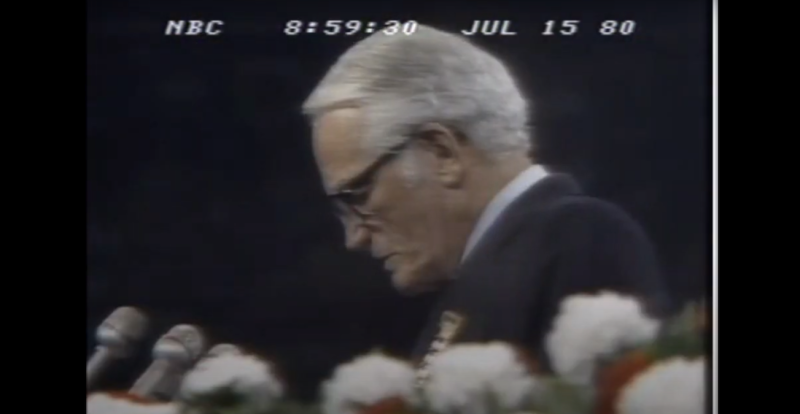Goldwater's 1980 RNC Speech Resonates Amid Biden's Failures
By: John Daniel Davidson (The Federalist)



Forty-two years ago this month, the Republican National Convention in Detroit nominated Ronald Reagan for president, a move that would not only forever change the GOP but alter the course of American history.
Reagan's acceptance speech from the 1980 convention is understandably the famous one, but another convention speech is also worthy of remembrance today, when so much of what ailed America in the Jimmy Carter era seems to be back with a vengeance.
That would be Sen. Barry Goldwater's speech. Goldwater, the unlikely Republican nominee in 1964, was entering the final stretch of his long political career. In the 16 years since his failed run for the White House, he had become a kind of elder statesman of the conservative wing of the GOP that was then coming into power. He understood clearly the problems facing the country, and what to do about them. Above all, he told the truth.
Received at the convention hall to a loud, extended ovation, Goldwater launched into a speech that now reads like a commentary on the Biden administration. He opened with a "recital of the tragic miscalculations of the president and his administration."
"Those economic decisions that have given us the highest rate of inflation in our history. Those foreign policy decisions which have cost us the respect of our enemies and destroyed the confidence of our friends throughout the world. And those military decisions which have reduced us to the rank of a second-rate power."
These problems, Goldwater explained, are not the fault of the American people, who did not forget who they are or abandon the principles of the Declaration of Independence. "And yet this beloved country of ours stands in great peril," he said. "Our fellow countrymen are distraught, confused, alarmed, and uncertain. Fear and distress abound."
As in 1980, so it is today. The flurry of recentcomparisons in the corporate press between President Joe Biden and former President Jimmy Carter attest to the parallels. Never mind that most of these pieces are facile attempts to defend the Biden administration by arguing that, really, Carter wasn't that bad and the failures of his presidency weren't his fault. The comparison is nevertheless apt.
The fact is, America in 2022 is beset with problems that look a lot like the problems of the Carter era: record-high inflation, gas prices at historic highs, rising crime, multiple foreign policy crises, flagging confidence in the American military, and economic recession hanging in the air. Like Carter, Biden is unequal to the task. Not only does he seem incapable of fixing these problems, he doesn't even seem to understand them (and his administration refuses to acknowledge them).
Goldwater, who saw all these things playing out during the Carter administration, knew what was needed: "It is my solemn belief that we must order a dramatic change in the course this country is headed."
The rising distrust of the government — as well-deserved in 1980 as it is today — must change to confidence in it, he said. There must be a change from uncertainty and weakness to strength and trust. We must "turn our backs on the false promises of something for nothing" and the "perpetual care and eternal bliss" of a "super-federal state," and reaffirm our belief in a Constitution that "guarantees individual freedom, and demands individual responsibility."
Not surprisingly, given the ongoing Iran hostage crisis and rising tensions with the Soviet Union, Goldwater emphasized the need for a strong foreign policy and a peerless military. Taking a shot directly at Carter over the Iran debacle, he said, "If our leaders had displayed the guts and the courage that America is noted for, no country in this world would ever have taken hostages from us."
Instead, America was projecting weakness: "Other nations in the free world, dismayed and confused by the aimless, inconsistent, contradictory foreign policy of the United States, have lost confidence in our leadership."
Almost every charge Goldwater leveled at the Carter administration and the Washington establishment in 1980 could be leveled at Biden and the political establishment today. What, after all, is Biden's foreign policy if not aimless, inconsistent, and contradictory? After the disastrous U.S. withdrawal from Afghanistan last fall, Biden has embarked on a muddled and ineffectual response to Russia's invasion of Ukraine, with an open-ended commitment of financial aid and weapons that has depleted our resources and distracted from the only genuine major threat to American national security: communist China.
Even if younger Americans today have no memory of the Carter years, their dissatisfaction with Biden after less than two years in office mirrors the dissatisfaction with Carter near the end of his single term in office. Recent polling showed Biden with a record low 36 percent approval rating, which is around where Carter's approval rating was for the last 10 months of his presidency.
Goldwater ended his convention speech on a note of warning that America was in grave danger. "We are Republicans," he said. "We love our republic. And our job, ladies and gentlemen, is to defend it — and let me tell you, save it."
Perhaps more than any other figure at that time, Goldwater understood the peril of utopians getting control of government, and that taking power back from them was the only way to save the republic.
John Daniel Davidson is a senior editor at The Federalist. His writing has appeared in the Wall Street Journal, the Claremont Review of Books, The New York Post, and elsewhere.






